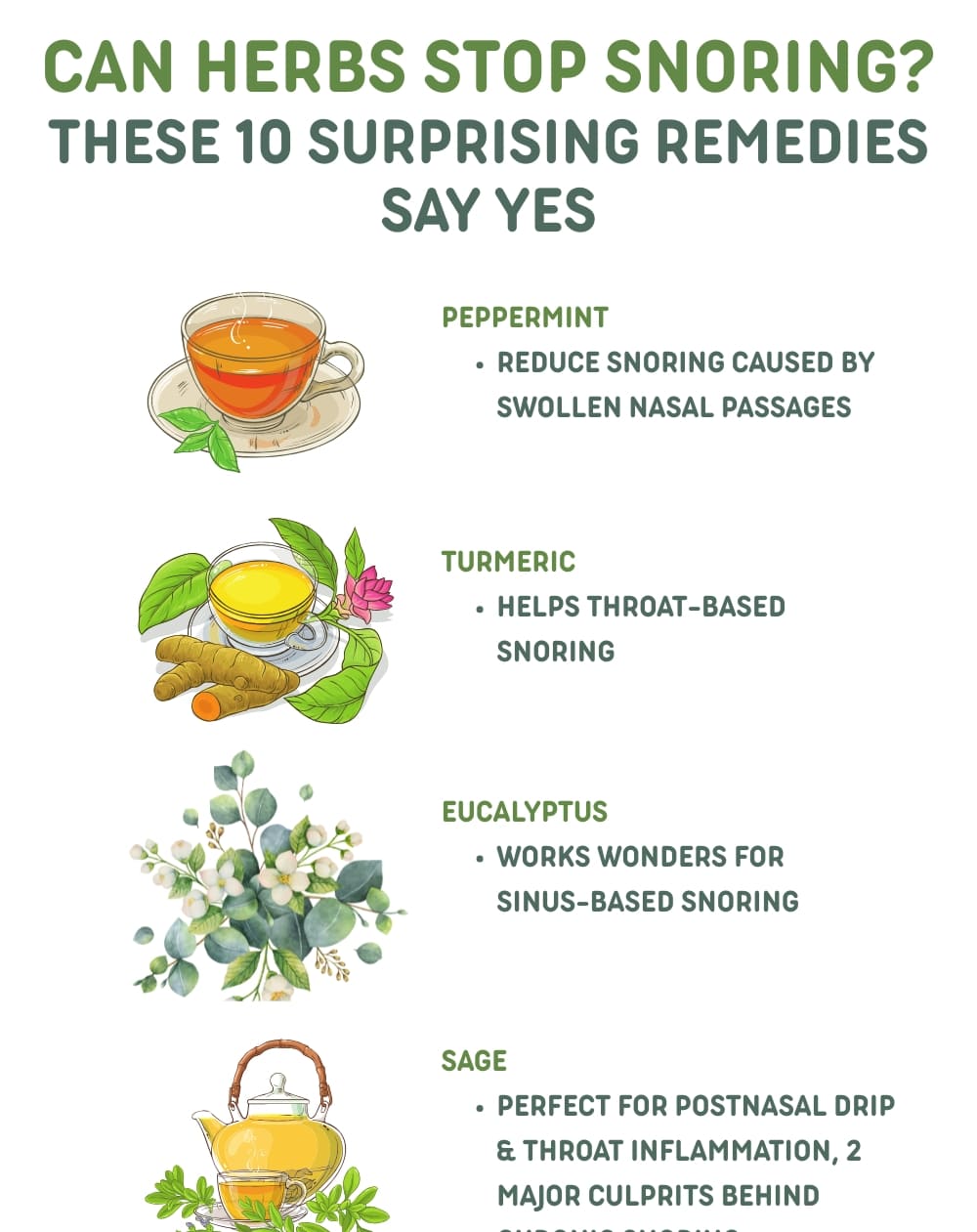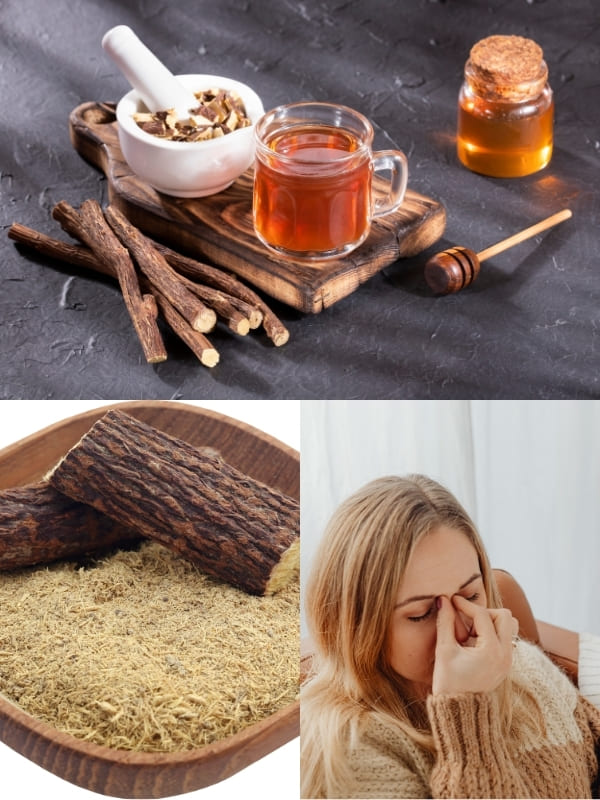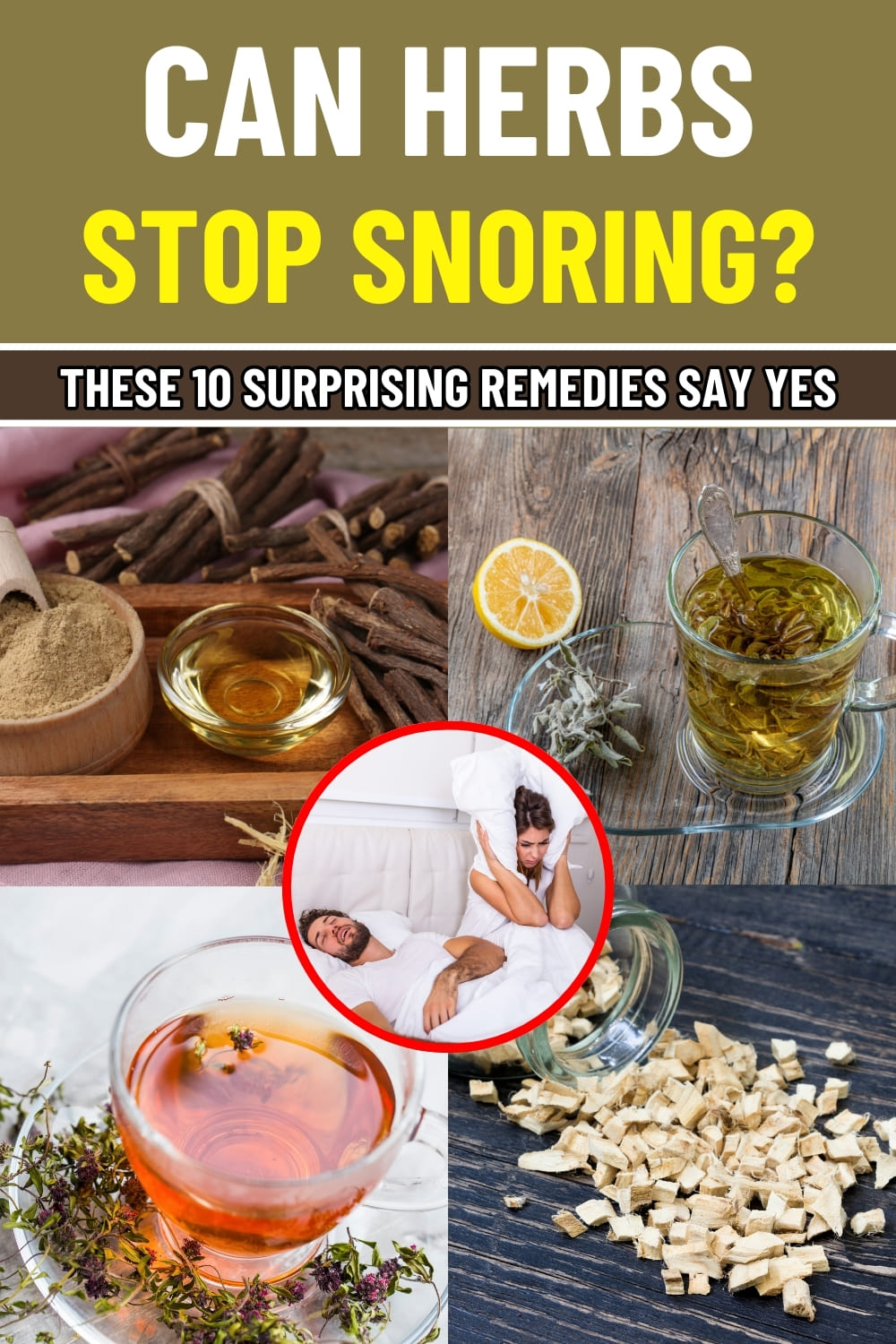Whether you’re the snorer or the one who’s wide awake listening to it, snoring is more than a nighttime nuisance. It disrupts sleep, leaves you groggy, and can even cause tension between partners.
But before you invest in another pillow, mouthpiece, or nose strip, there’s something gentler and often overlooked: herbs.
Yes, herbs for snoring may sound simple, but certain natural plants have powerful effects on the muscles and tissues involved in snoring.
So, if you’re ready to trade the rumble for restful silence, this list of herbs might just be your best bedtime discovery yet.

1. Peppermint: Clears Airways and Reduces Nasal Congestion
Peppermint is more than a refreshing tea; it’s a natural decongestant with anti-inflammatory powers that can reduce snoring caused by swollen nasal passages.
According to a study in the Journal of Ethnopharmacology, menthol in peppermint helps relax bronchial muscles and improve airflow.
How to Make:
First, steep 1 tablespoon of dried peppermint leaves in boiling water for 10 minutes. Next, strain and sip slowly 30 minutes before bed.
Use nightly, and expect improved breathing and reduced snoring within one week.

2. Turmeric: Reduces Throat Inflammation
Turmeric’s golden glow comes from curcumin, which is its anti-inflammatory and antioxidant powerhouse. It helps shrink tissue swelling that contributes to throat-based snoring.
A study in the Journal of Clinical Immunology noted curcumin’s effectiveness in reducing inflammation-related airway obstruction.
How to Make:
Mix ½ teaspoon of turmeric and a pinch of black pepper into warm almond or oat milk. Stir until smooth, then drink slowly before sleep.
Use consistently for 2–3 weeks for lasting results.

3. Eucalyptus: Steam Away Stuffy Sinuses
Eucalyptus works wonders for sinus-based snoring. It breaks up mucus and reduces inflammation in the nasal cavity, allowing for easier breathing.
Research published in Evidence-Based Complementary and Alternative Medicine confirms eucalyptus oil’s decongestant properties.
How to Use:
Boil water in a large bowl, then add 5 drops of eucalyptus essential oil. Drape a towel over your head and inhale the steam deeply for 5–7 minutes.
Repeat nightly to maintain clear nasal passages.

4. Ginger: Strengthens the Airways
Ginger not only warms the body but also strengthens respiratory muscles and reduces oxidative stress that can weaken airway tone, a common snoring trigger.
According to a study in Molecular Nutrition & Food Research, gingerol compounds support respiratory function and reduce inflammation.
How to Make:
Peel and slice 1 inch of fresh ginger. Boil it in 2 cups of water for 15 minutes. Add lemon or honey if desired.
Drink 1–2 times a day. Daily use for 2+ weeks can help tone airway tissues.

5. Thyme: Targets Sleep-Related Breathing Issues
Thyme has long been used for respiratory ailments. It acts as a bronchial relaxant and works particularly well for people whose snoring worsens during deep sleep.
A 2013 study in The Natural Product Journal highlighted thyme’s antispasmodic and antimicrobial activity.
How to Use:
Steep 1 teaspoon of dried thyme leaves in boiling water for 8–10 minutes. Drink before bed, or rub diluted thyme essential oil on the bottoms of your feet.
Regular use can reduce snoring caused by sleep apnea and throat tightness.

6. Chamomile: Relaxes Throat and Jaw Muscles
Chamomile is a gentle herb known for its relaxing effects, but it also eases muscle tension in the throat and jaw, which can minimize soft tissue vibrations.
Research in the journal Sleep and Breathing supports chamomile’s role in improving sleep quality and reducing mild obstructive snoring.
How to Make:
Steep 1 tablespoon of dried chamomile flowers in hot water for 10 minutes. Strain and drink 30 minutes before bed. Pair with a warm bath or foot soak for a deeper calming effect.

7. Sage: Combats Mucus and Throat Congestion
Sage’s antibacterial and astringent properties make it perfect for postnasal drip and throat inflammation, which are two major culprits behind chronic snoring.
A study from Planta Medica notes sage’s role in reducing mucosal inflammation and drying up excess mucus.
How to Use:
Steep 1 teaspoon of dried sage in boiling water for 5–7 minutes. Add a pinch of salt and gargle with the solution before bed.
You can also sip the tea for added benefits.

8. Marshmallow Root: Coats and Calms the Throat
Marshmallow root is rich in mucilage, which coats irritated tissues in the throat, reducing vibration and snore-causing dryness.
Research published in The Journal of Herbal Medicine supports its demulcent properties and soothing effects on inflamed mucous membranes.
How to Make:
Soak 1 tablespoon of dried marshmallow root in cold water for 4 hours. Strain and drink before bed.
Use nightly for 7–10 days to notice reduced irritation.

9. Licorice Root: Opens Airways and Soothes the Throat
Licorice root fights inflammation and irritation in the airways and is especially useful for snorers who deal with allergies or chronic sinus issues.
A study in BMC Complementary Medicine and Therapies found glycyrrhizin effective in reducing airway inflammation and easing congestion.
How to Make:
Simmer 1 teaspoon of dried licorice root in water for 15 minutes. Strain and drink once per day.
Use cautiously and avoid if you have high blood pressure.

10. Lemon Balm: Relieves Stress and Muscle Tension
Lemon balm is a calming herb that reduces stress-induced snoring. It helps relax tight throat muscles and improves overall sleep depth.
According to research published in Neurochemical Research, lemon balm increases GABA activity in the brain, promoting calm and reducing tension.
How to Make:
Steep 1 tablespoon of dried lemon balm in hot water for 10 minutes. Drink in the evening, ideally 30–45 minutes before bed. Great when blended with chamomile or lavender for a calming combo.

How to Incorporate These Herbs into Your Daily Routine
Start with identifying your snoring type: nasal congestion, throat vibration, or stress-related tightness. Then, choose 2–3 herbs that target your specific triggers. For example:
- Nasal issues? Go with eucalyptus, peppermint, and sage.
- Throat-based snoring? Try turmeric, ginger, and marshmallow root.
- Tension snoring? Combine chamomile, lemon balm, and thyme.
Build a nightly routine:
- Brew a calming tea blend
- Use a steam session or gargle
- Diffuse oils like peppermint or thyme in your bedroom
Keep it consistent. Most people notice reduced snoring within 1–2 weeks of daily use. Keep a sleep journal if needed to track improvements.
Cautions and Precautions
Though these herbs are generally safe, some may interact with medications or underlying health conditions. For example, licorice root can raise blood pressure and shouldn’t be used by those with hypertension.
Peppermint and eucalyptus oils should be avoided internally by young children or individuals with asthma.
Always test essential oils or teas in small amounts first to check for allergic reactions.
If you’re pregnant, breastfeeding, or managing chronic illnesses like sleep apnea or asthma, consult your healthcare provider before using any new herbal remedies.
Disclaimer
This article is intended for informational purposes only and is not a substitute for professional medical advice, diagnosis, or treatment.
Always consult your healthcare provider before beginning any herbal regimen, especially if you are on medication or have a medical condition.

10 Natural Herbs to Stop Snoring Without Gadgets or Gimmicks
